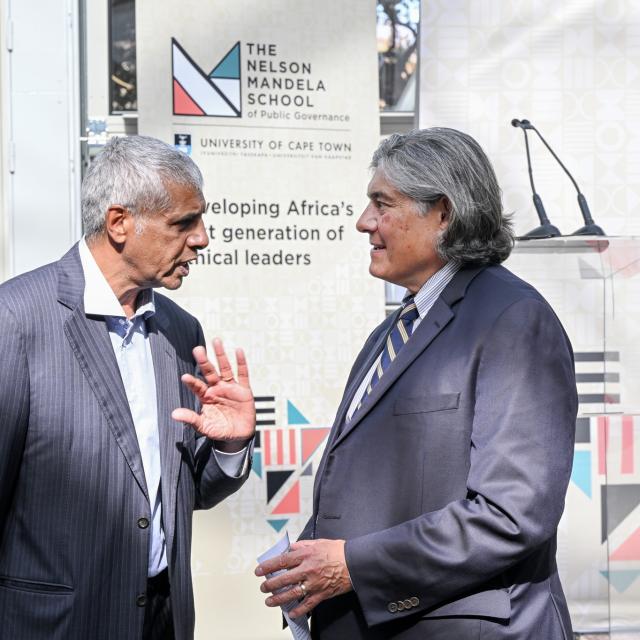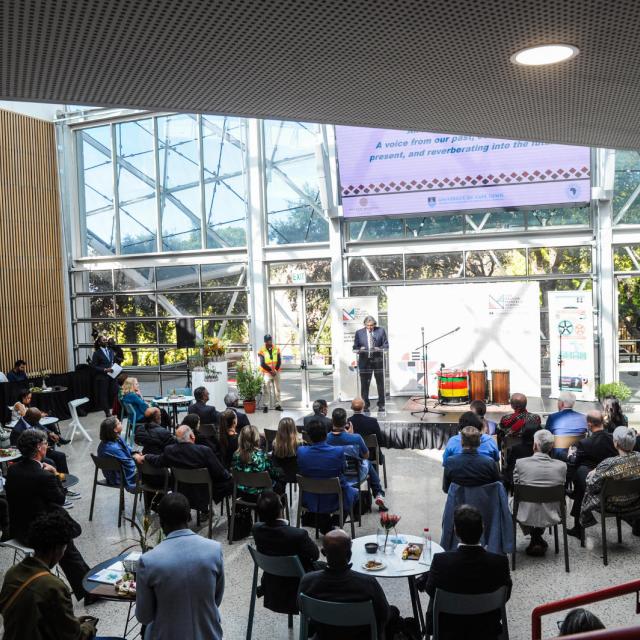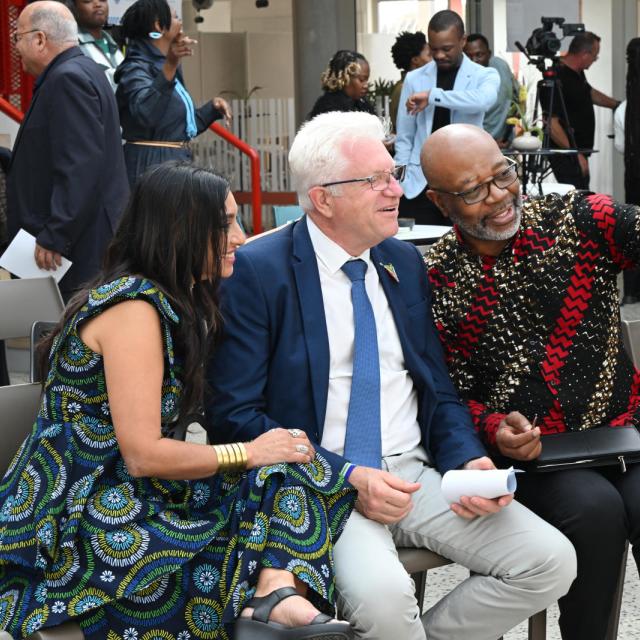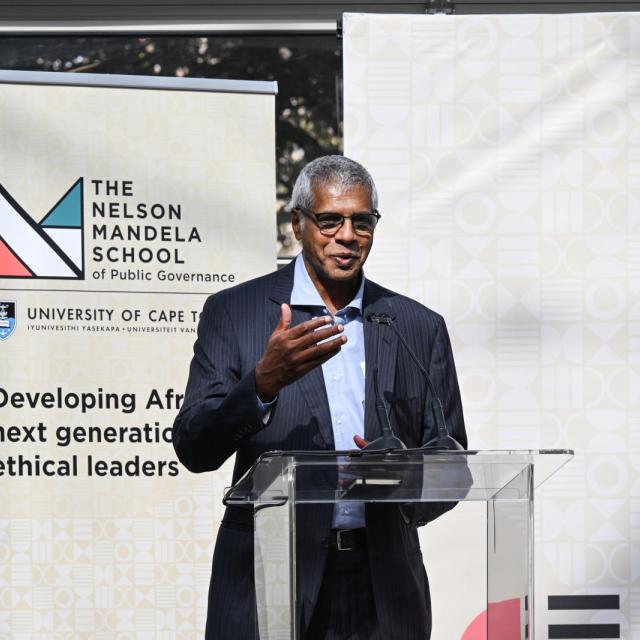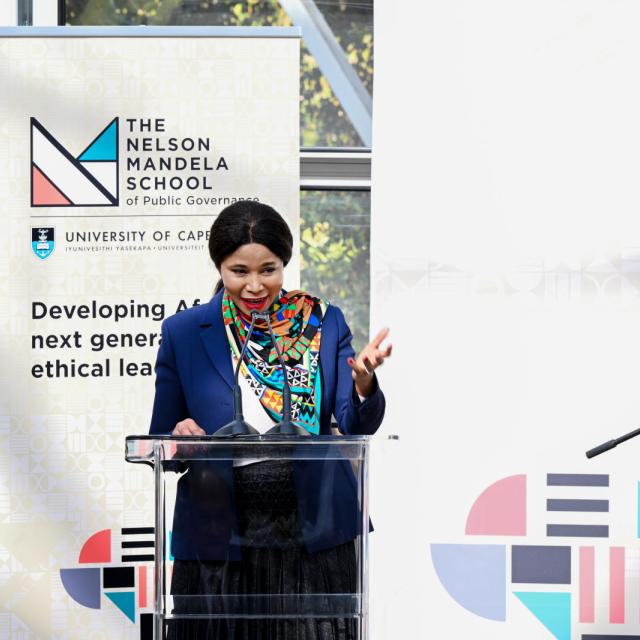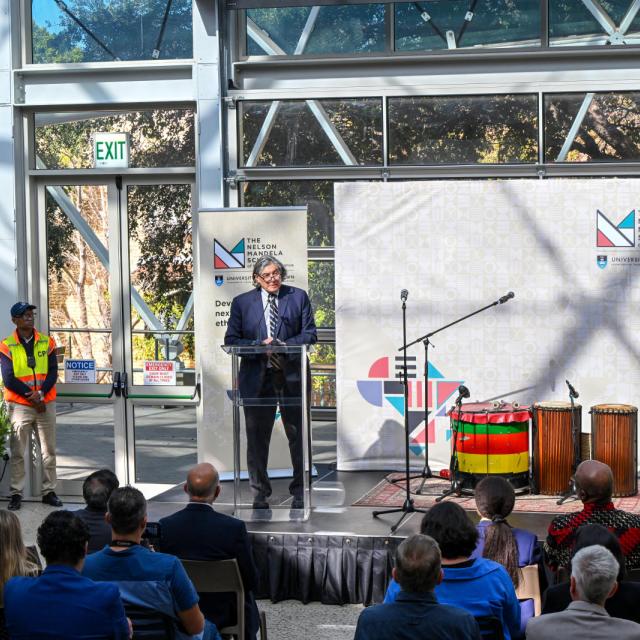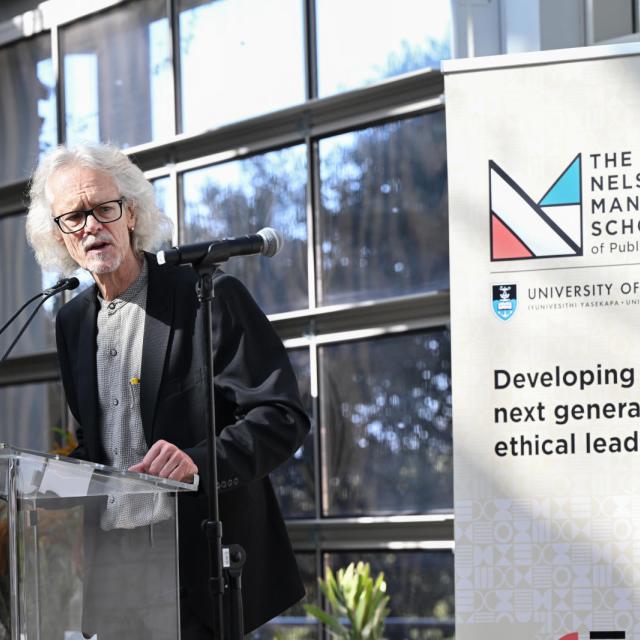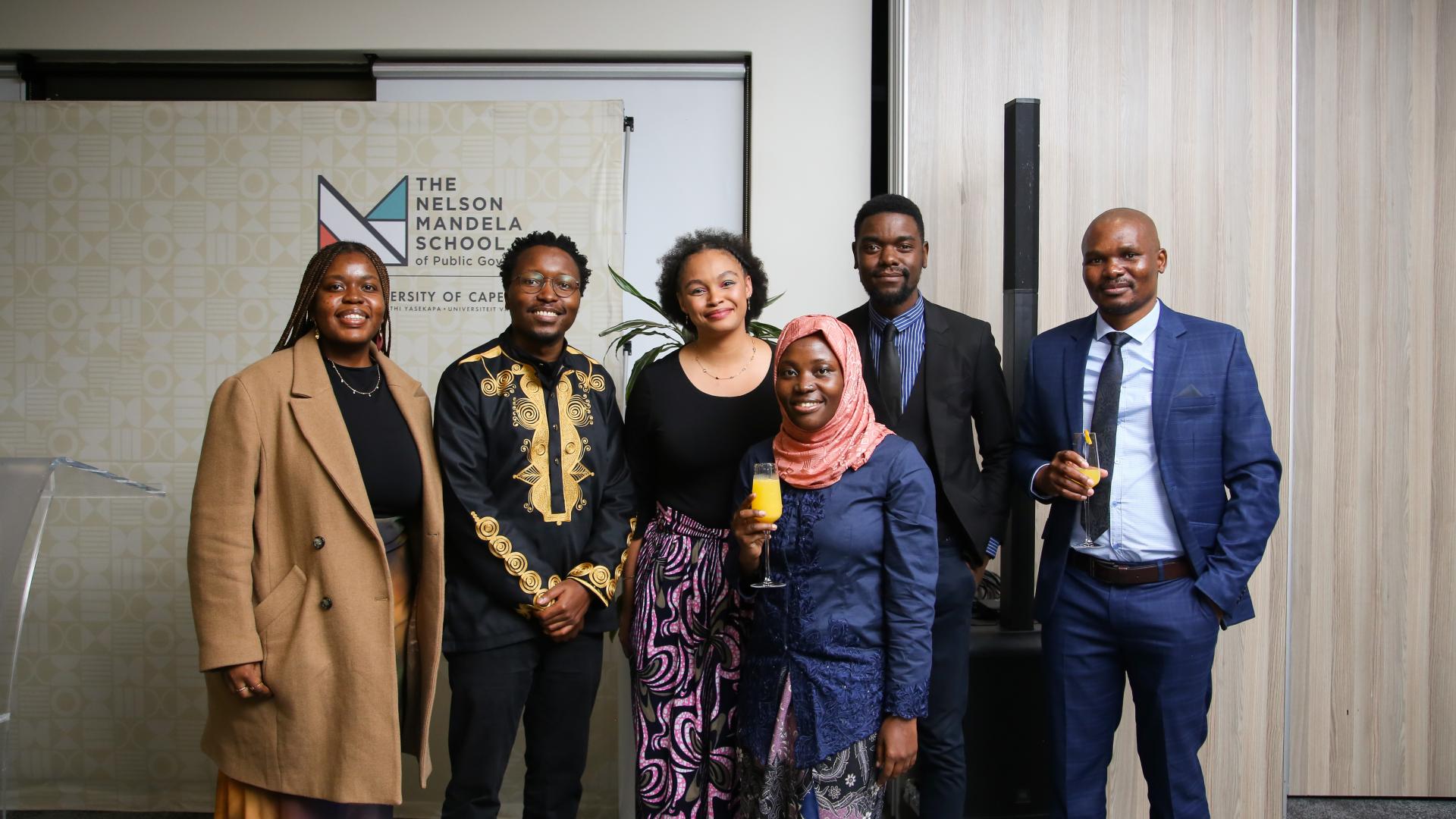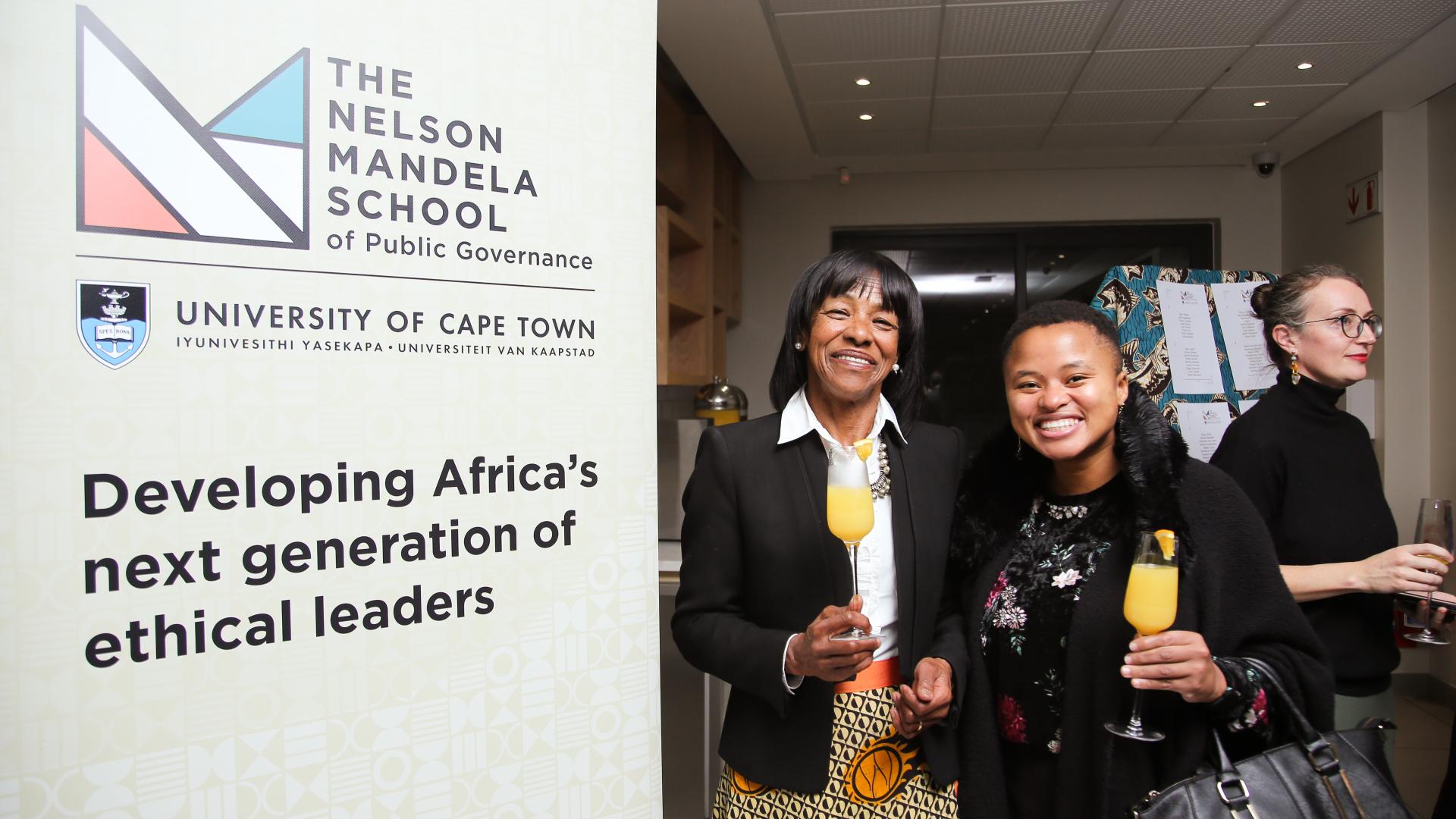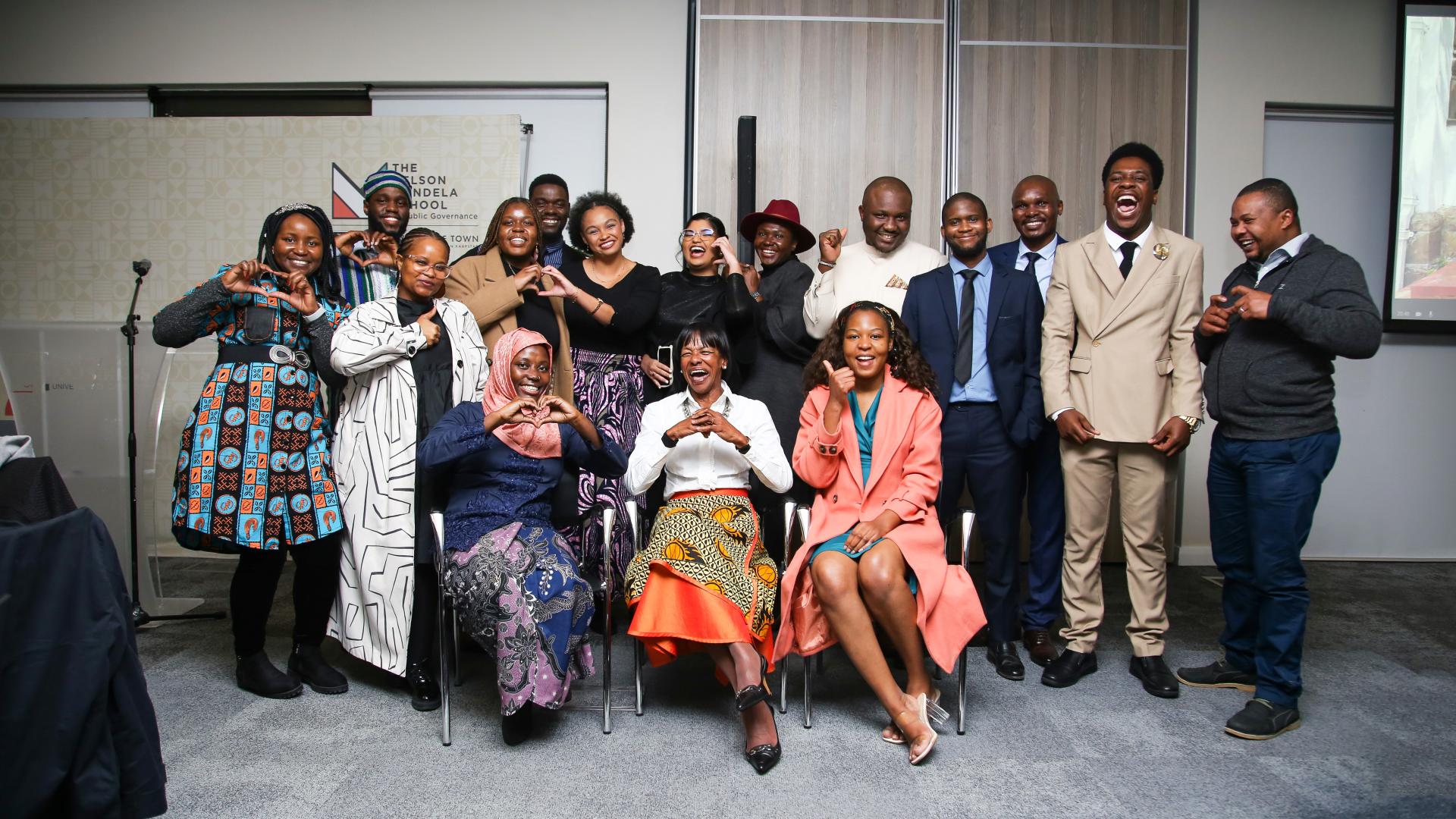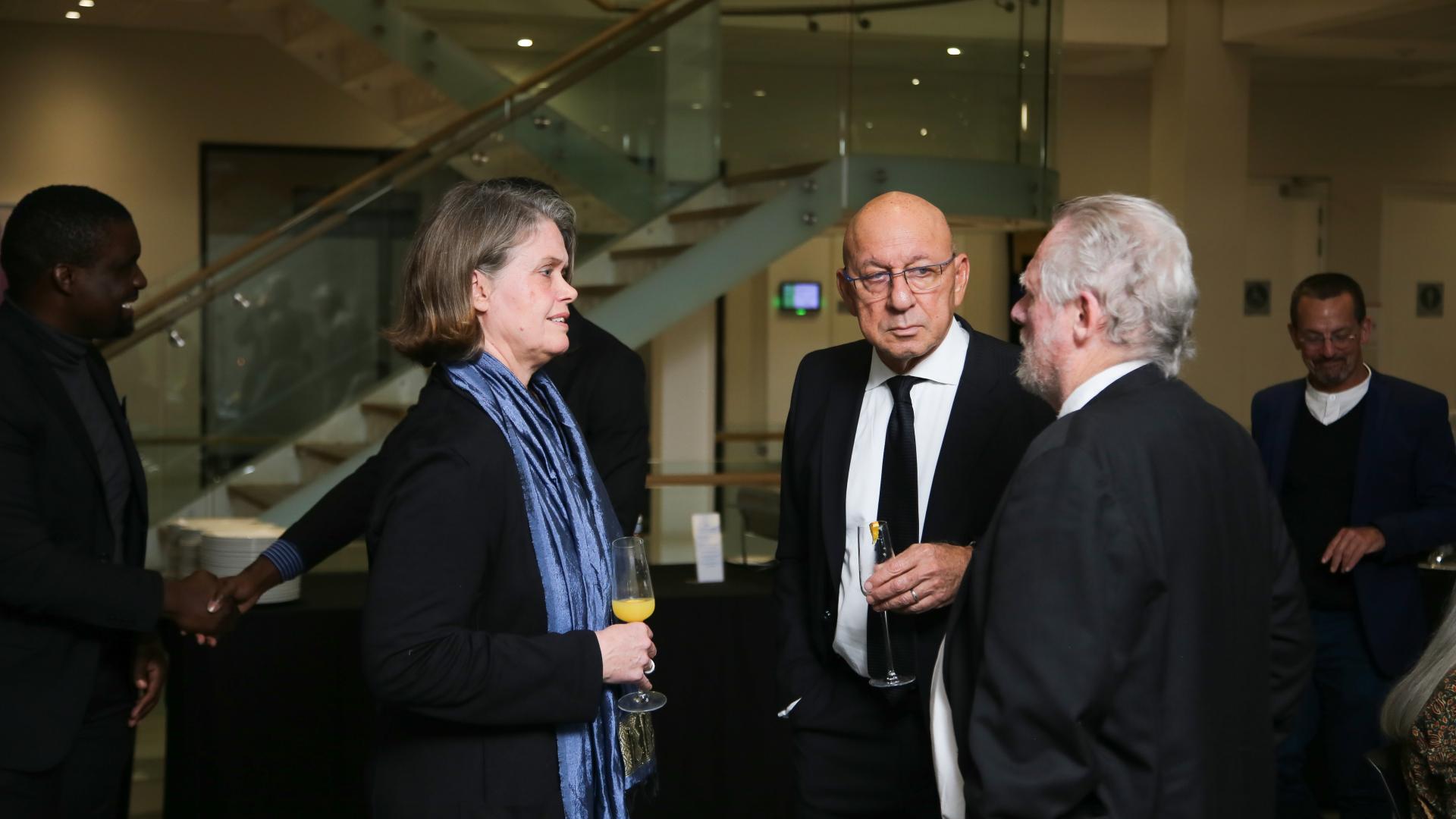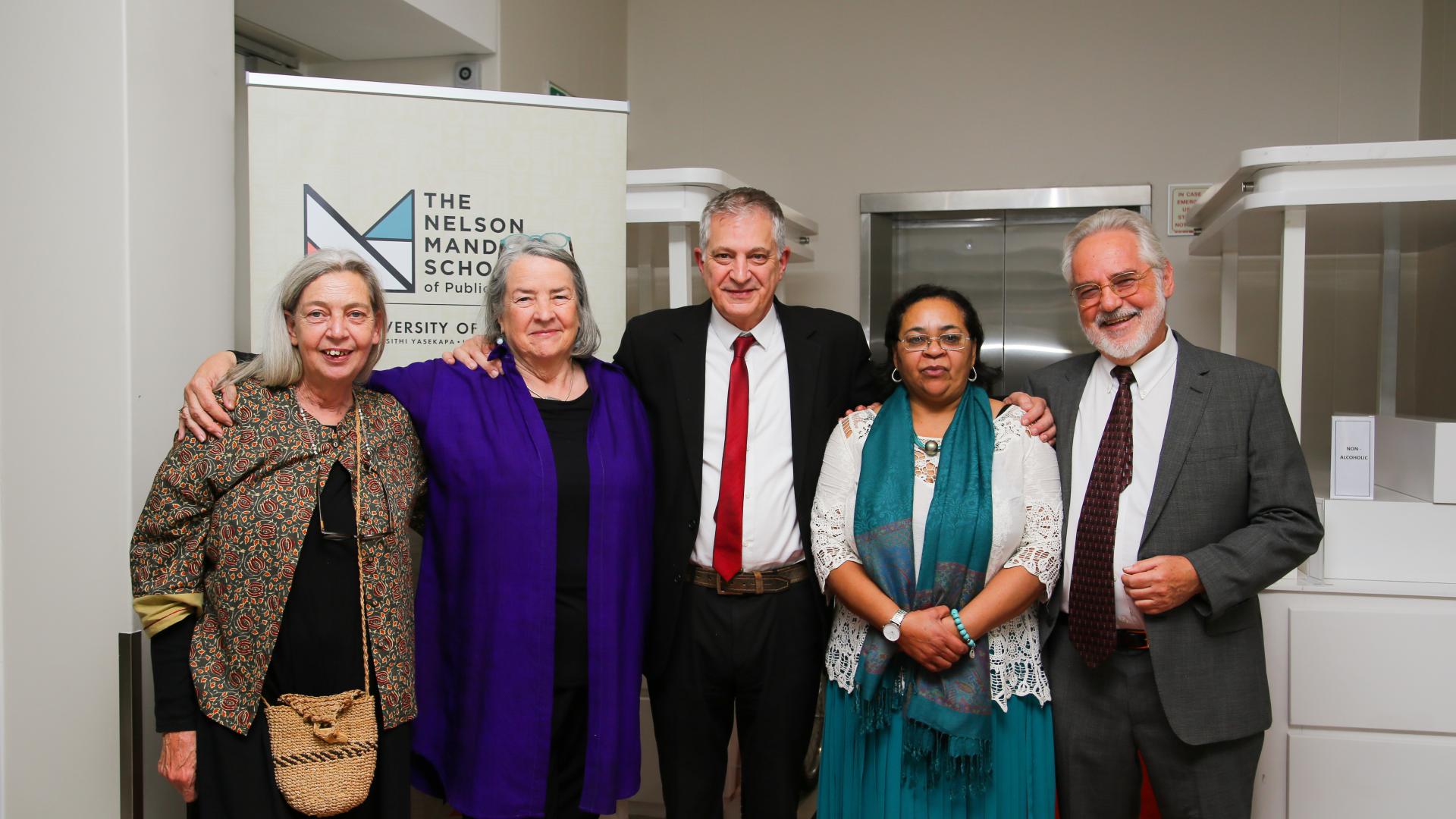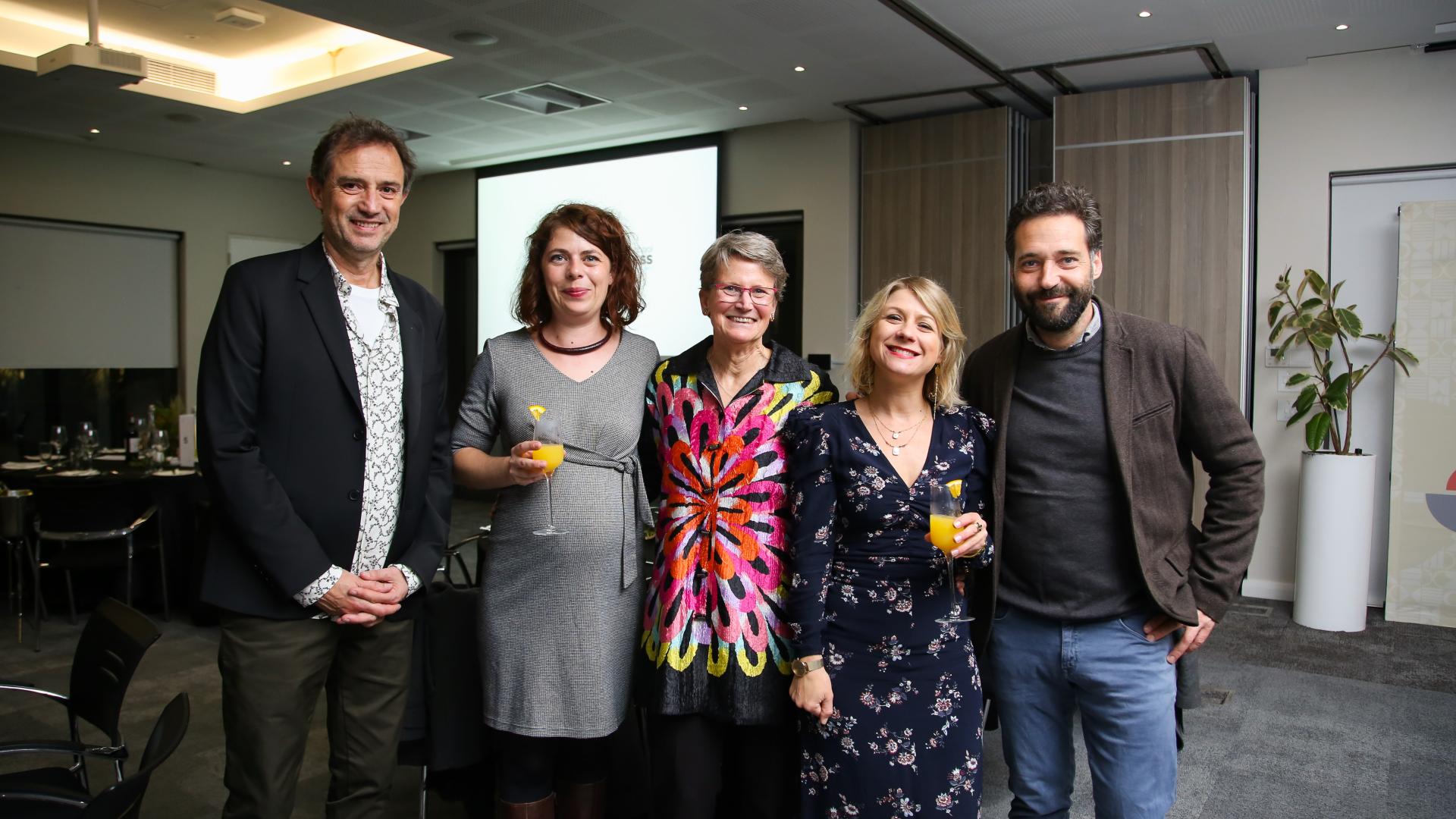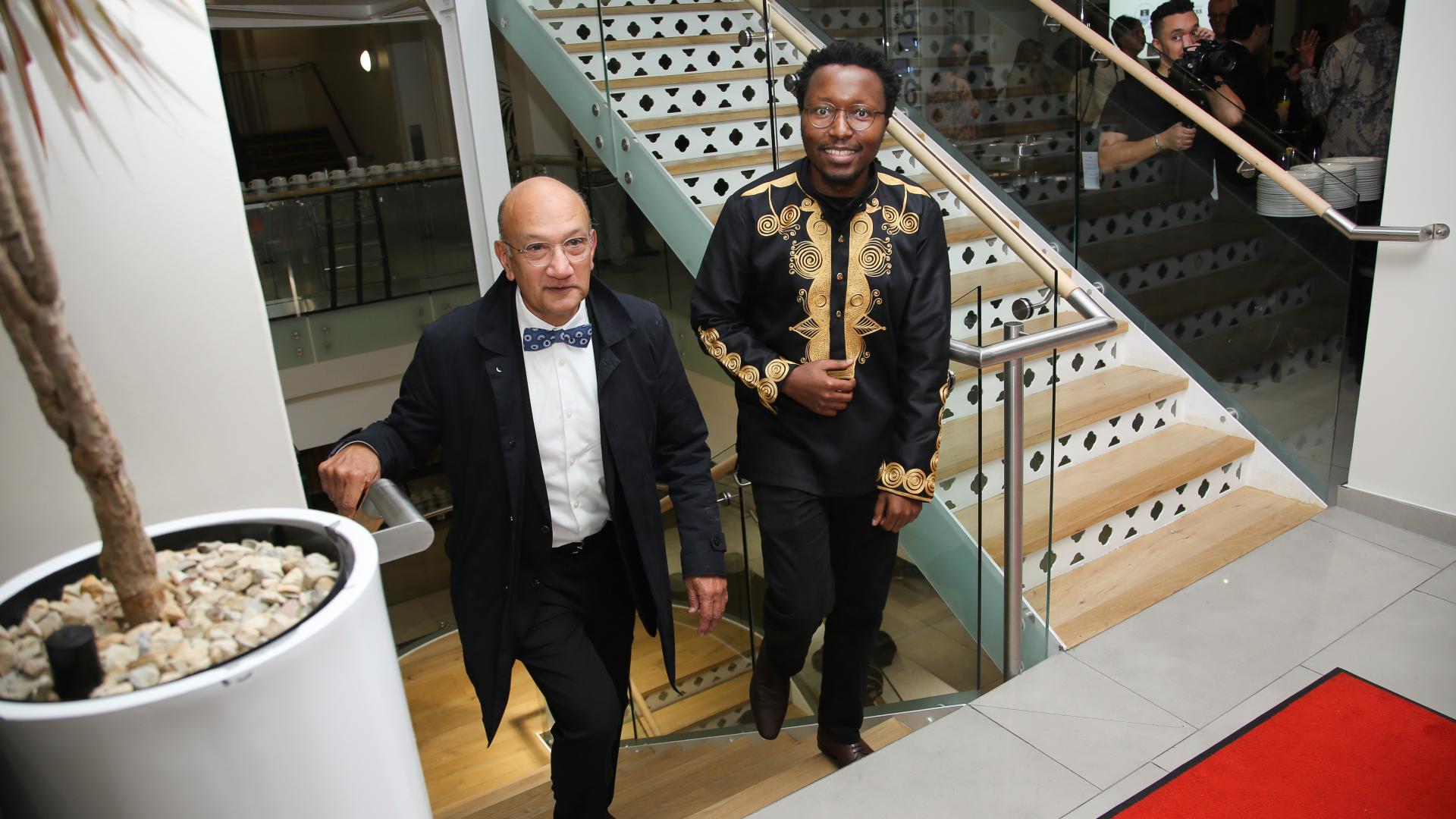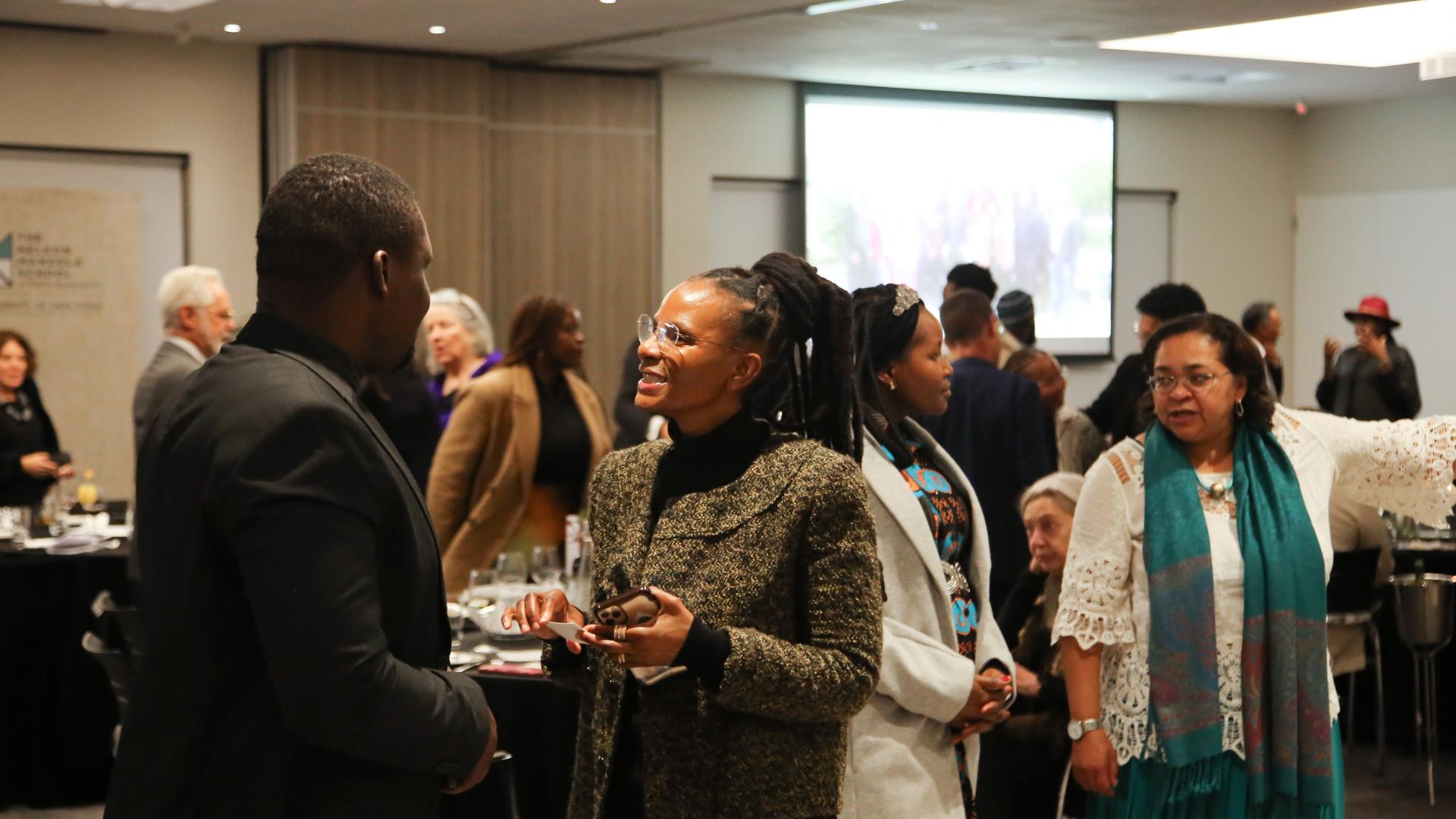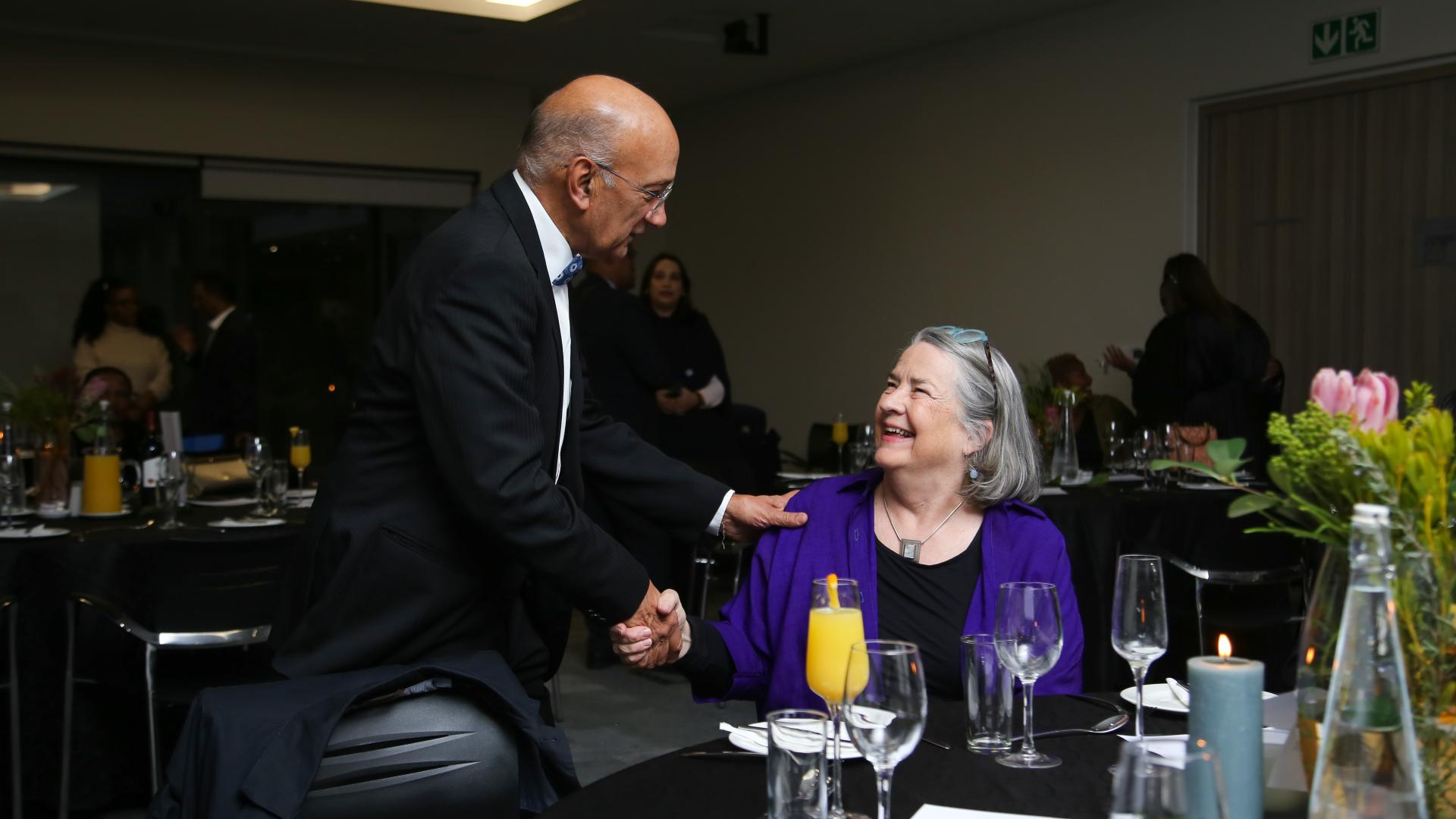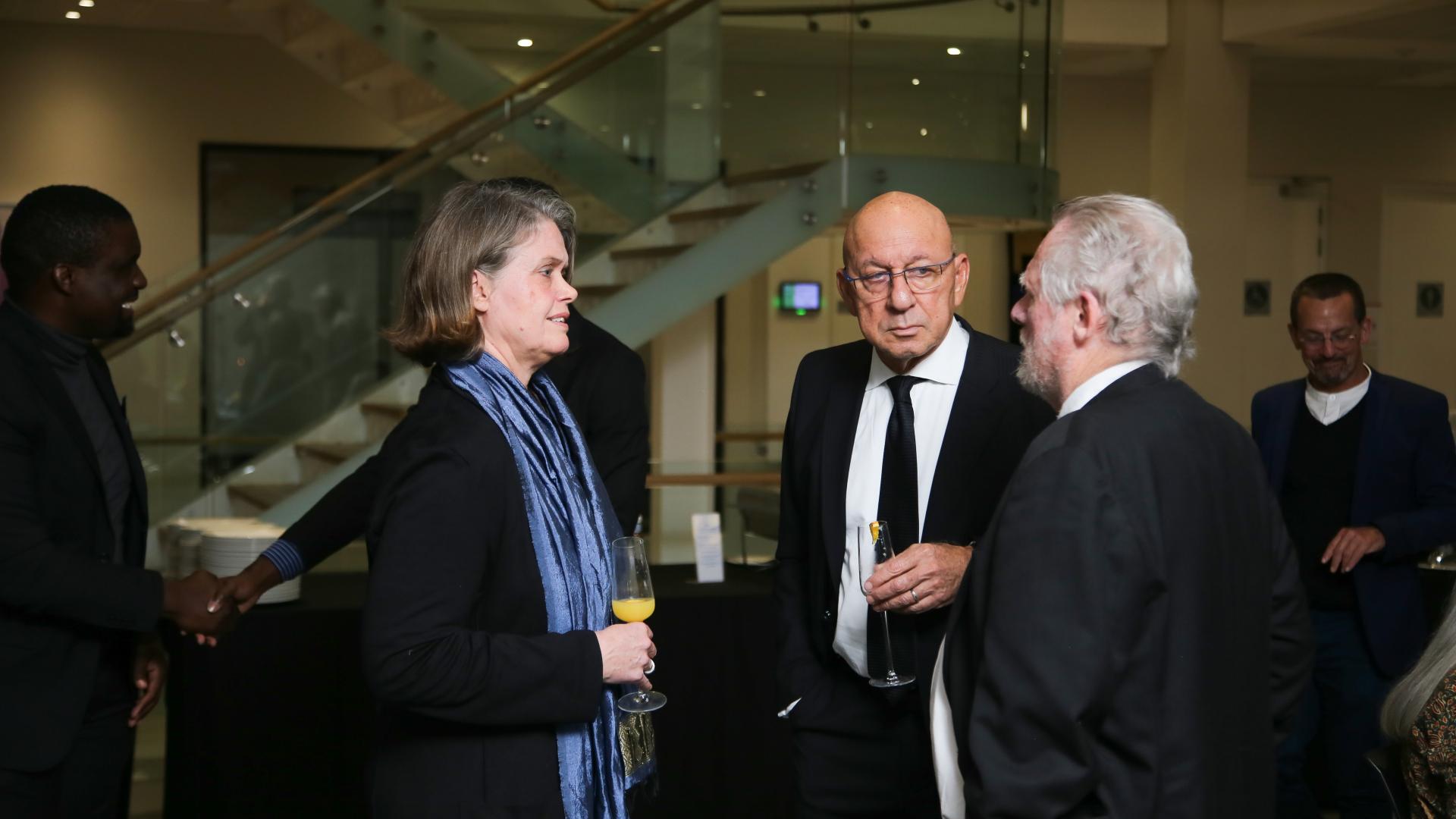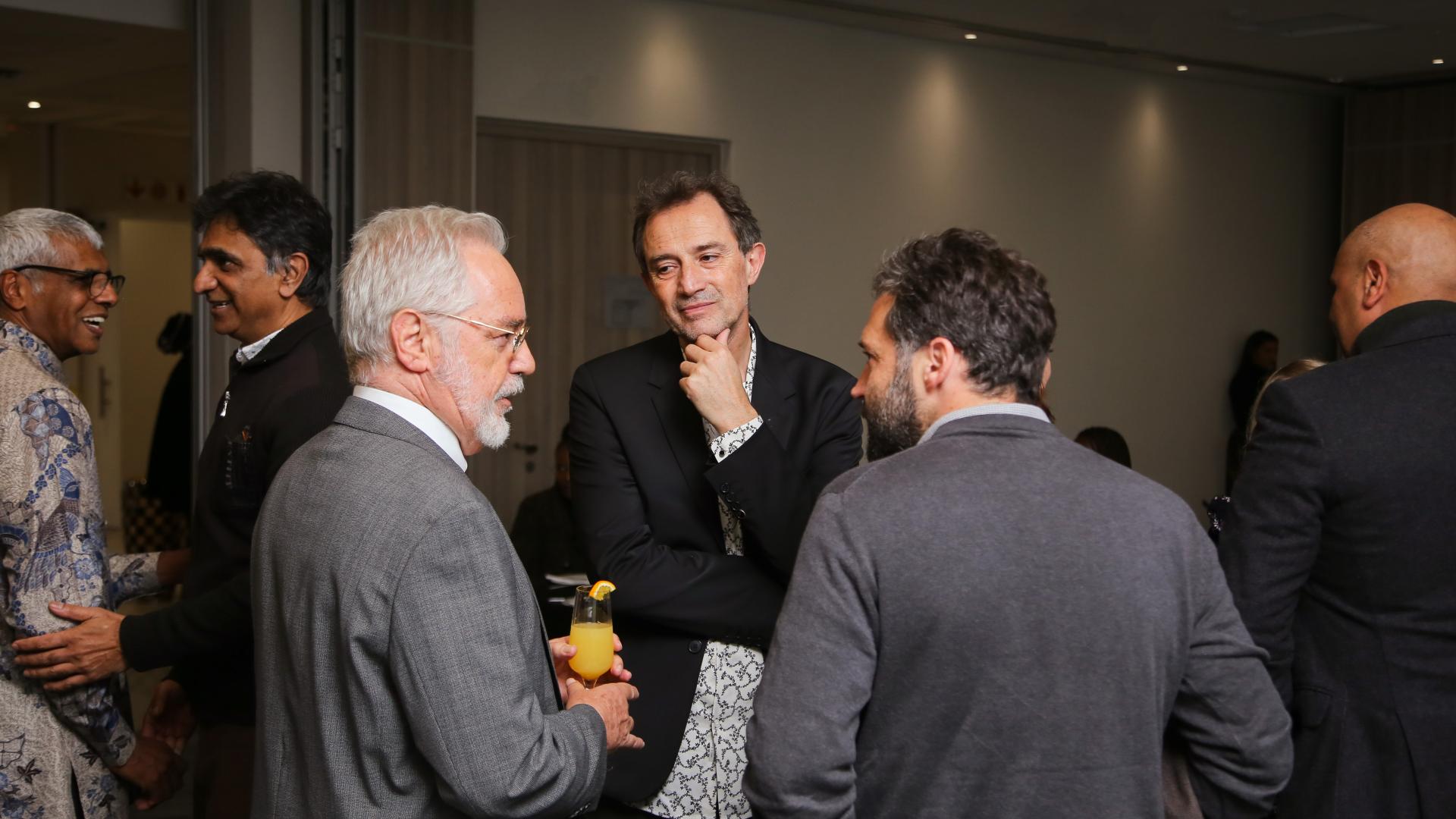News and updates from the Nelson Mandela School

Siviwe Gwarube paid a surprise visit to her fellow MDPP 2024 cohort during their contact session on campus. Ms Gwarube has been appointed Minister of Basic Education since July 2024.
From the Director's Desk
The School continues to grow and our mission to develop the next generation of Africa’s ethical leaders remains steadfast. The launch of the Nelson Mandela Memorial Centre and School of Public Governance in May 2024 was a defining moment in the history of the School.
We are grateful for the many messages of support received on this occasion including from the AfCFTA Secretariat, Wamkele Mene and judge Albie Sachs for the Nelson Mandela Memorial Centre and School of Public Governance. The Nelson Mandela Memorial Centre and School of Public Governance will serve emerging leaders from across the African continent. The precinct, which will be designed through an architectural design competition, will offer interactive public art installations, contemplative walkways, and meeting areas designed to provide for reflection on the life and times of Nelson Mandela.
The concept of leadership is engaging citizens and the political classes around the world as elections are taking place and many countries are moving backwards, sliding into more populist and authoritarian regimes and losing sight of the values that Nelson Mandela taught and demonstrated in his own life of public service.
It is with this understanding that we have launched a leadership series this year that has gathered a lot of interest on the continent. The School aspires to become a centre of debate and dialogue on Leadership and Democratic Governance - providing guidance and insights to the next generation of African leaders. During the first half of 2024, the School is engaging with Universities and think tanks on partnerships to build innovative theoretical frameworks and approaches that will deepen our understanding of Leadership for transformative changes needed to address today’s complex challenges. In this context, the School has joined a global research project on Democracy and Development led by the Central European University Democratic Institute (CEU-DI) and has also partnered with the United Nations System Staff College (UNSSC) to launch a Nelson Mandela Leadership for Social Change executive education programme. In addition, the School has also partnered with the French development agency (AfD) to build a network of think tanks and Universities on the African continent.
Thank you for your ongoing support, we are excited about what lies ahead. We aim to expand our academic programmes, policy-driven research and to strengthen our networks across the continent.
Prof Faizel Ismail
Director
The Nelson Mandela School of Public Governance
University of Cape Town
The Nelson Mandela Memorial Centre and School of Public Governance launch
“The Nelson Mandela Memorial Centre will promote the ideals of Chuck Feeney. It will educate, train and develop ethical leadership that serves communities, nations and the world. I thank the Nelson Mandela Foundation for its steadfast support and guidance to ensure that this partnership honours Madiba’s legacy. We are conscious of the responsibility of using Mandela’s name,” Emeritus Professor Daya Reddy.
Photos: Lerato Maduna
Dr Musa Nxele is the newly appointed academic director
Dr Musa Nxele took the reins of the Academic Directorship on 1 June 2024. Dr Nxele holds a PhD in Economics from the Université de Paris 1 Panthéon-Sorbonne and a PhD in Development Policy and Practice from the University of Cape Town. He teaches the political economy of policymaking and development. His research currently focuses on the politics of private investment and the economics of natural resources.
Congratulations to Dr Nxele on this significant position. With his thoughtful and dedicated leadership, the Academic programme is growing exponentially across Africa. In 2025, the School will launch its newly designed PGDip in Development Policy and Practice online to make it more accessible and affordable.

The School’s Academic Programme celebrates a decade of academic excellence
The Nelson Mandela School of Public Governance at the University of Cape Town marked a significant milestone this July, reflecting a decade of dedication to fostering leadership, governance, and public service across Africa. It has been ten years since the School's Academic Programmes started. Over 250 students have registered for postgraduate studies at the School since 2014. This decade-long journey highlights the School's impactful contribution to public service and governance in Africa.
The leadership we need
The students, graduates and fellows of the Nelson Mandela School continue to make impact in their respective spheres of influence throughout the continent. We are incredibly proud to know that our work transcends the lecture room and it is the bridge in which communities are impacted. As the School, we believe that our students hold the hope of the leadership we need.
Join us as we celebrate some of our students and fellows in their newly appointed public office positions:
- Siviwe Gwarube (MDPP, 2024 cohort) - Minister of Basic Education
- Edwin Bath (MDPP alumnus, 2022 cohort) - Member of Parliament
- Vuyolwethu Zungula (MPhil alumnus, 2022 cohort) - Member of the National Assembly
- Refiloe Nt’sekhe (MDPP alumna, 2019 cohort) - Member of Provincial Legislature
- Ciska Jordaan (SALGA Women in Leadership fellow) - Member of the National Assembly
.......................................
The impact of the School’s alumni and students extend beyond public office; we are pleased to introduce one such individual, Richard Teny. Richard is a South Sudanese national who has devoted his entire career to providing high-quality and effective leadership in the field of humanitarian and social development. He currently serves as the Executive Director of Coalition for Humanity (CH), a prominent non-profit organisation dedicated to addressing livelihood challenges faced by the people of South Sudan.
Richard is a PhD candidate after completing his Master of Development Policy and Practice (MDPP) at the Nelson Mandela School. It is encouraging to see how Richard effectively applies the skills and knowledge acquired from MDPP to drive the growth and development of his individual staff members, granting them sufficient autonomy and guidance to challenge their performance limits. This approach not only contributes to the professional development of the team but also aligns with the broader mission of the organisation, Coalition for Humanity – to create resilient communities that can thrive amidst challenges. His journey exemplifies a harmonious blend of leadership, academia, and a profound commitment to the well-being of communities in South Sudan.

The School is a convening space for policy-driven dialogues
One of the objectives at the School is to provide critical thinking on the challenges of democratic governance in Africa by providing evidence-based insights to inform policy decisions and promote informed public discourse. During the first half of 2024 the Nelson Mandela School convened several conversations on Leadership and Democratic Governance.
Conversations with former judge Albie Sachs
On the eve of South Africa’s seventh democratic election, while the rainbow nation and its achievements (or lack thereof) is placed under scrutiny, the Nelson Mandela School of Public Governance at the University of Cape Town (UCT) hosted an intimate afternoon to reflect on the early years of Constitutionalism.
Attendees in the room and online, who joined the third instalment of the school’s Democratic Governance and Leadership series, were in good company, as anti-apartheid stalwart and former Constitutional Court judge Albie Sachs pulled up a chair and discussed the independence of the country’s highest court. The dialogue tied together a thought-provoking series, which included a single common theme: the late former president Nelson Mandela.
Moderated by the School’s Penny Parenzee, Sachs’s last talk of the series was held on Wednesday, 8 May, and was titled “Mandela and our constitutional democracy”. Prior discussions were titled “Mandela the lawbreaker” and specifically touched on the difficult period of the country’s struggle for liberation during the dark days of apartheid; and “Mandela and the making of our Constitution”, which explored the transition from apartheid to democracy. Click on this link to learn more.

Corruption: the centre of the democratic challenge
Ferial Haffajee and Advocate Gary Pienaar participated in the Leadership and Democratic Governance series and shared their thought-provoking views on “Corruption: the centre of the democratic challenge.” Dr Musa Nxele moderated this engaging conversation.Through this series the School aims to hold space for inspirational insights to help us formulate leadership strategies and practical solutions to rebuild resilient, democratic institutions.

.............................
The School hosted a discussion on State-Civil Society Organisations Relations | re-igniting social movements in the era of authoritarianism and polarisation
This discussion formed part of the Leadership series, a Leadership for social change theory aimed at developing a holistic analytical framework that will integrate the different elements that constitute Leadership and influence its ability to drive change. Mark Heywood moderated the discussion between Sibongile Ndashe, Tania Haddad and Brian Raftopoulos.
The Democratic Developmental State and Industrialisation: building on successes and failures
One of the challenges facing Africa today is how to improve the livelihoods of its citizens. Commodity dependence and weak structural transformation are the main reasons for the low levels of development in Africa. In light of this, the Nelson Mandela School hosted a discussion on the challenge of economic transformation in South Africa and the African continent.
In light of this, the Nelson Mandela School hosted a discussion on the challenge of economic transformation in South Africa and the African continent. Dr Alecia Ndlovu moderated an interactive conversation between Fiona Tregenna, Arkebe Oqubay, Adeyemi Dipeolu and Rob Davies.
Nelson Mandela Leadership Dialogue: Young Leaders Driving Social Change
Every day is #MandelaDay at the Nelson Mandela School of Public Governance. This year's commemoration was particularly special because we co-hosted the 'Nelson Mandela Leadership Dialogue: Young Leaders Driving Social Change' webinar with our partners at the United Nations System Staff College - UNSSC and the American University of Beirut (AUB). Watch and listen to this engaging conversation on how multi-actor and intergenerational approaches can drive transformative changes, particularly in Africa and the Middle East.
Nelson Mandela International Day 2024
The School’s Master of Development Policy and Practice (MDPP) 2024 cohort joined a team of community activists from Khayelitsha for Mandela Day. The visit to Bulumko Secondary School in Khayelitsha allowed the students to hear what the team was doing through arts and sports. The visit also included an interactive art therapy session and food gardening. Sophumla Ntoyabo (food security enthusiast), Mawethu Mapotolo (artist and poet), and Dumisani Wambi (basketball coach) shared their community work and aspirations with students with the hope of having future collaborations with the School.
AfCFTA Cotton, Textiles and Apparel Validation Workshop
The School is actively involved in Africa's structural transformation and economic development through its academic and research programmes. It has partnered with the African Continental Free Trade Area (AfCFTA) Secretariat to support the negotiations and implementation of the AfCFTA and to contribute to research in the development of regional value chains across Africa.
The impasse in the negotiations on the Rules of Origin, created the need to build a vision for a regional value chain in the fibre to textile and apparel value chain. The AfCFTA Secretariat established the AfCFTA Trade and Industrial Development Advisory Council in 2022, to assist the AfCFTA Secretariat. Faizel Ismail convenes the Council and Noncedo Vutula (a Senior Research Fellow in the School) coordinates the work of the Advisory Council. The Advisory Council is currently conducting consultations with the private sector that represent the different segments of the value chain with the aim to: (a) develop a five-year strategic plan for a continental fibre-to-garment value chain and (b) support the ongoing negotiations in the AfCFTA.
Three broad topics that are critical for the development of the sector were addressed by three working groups. These are: (i) investment, sustainability, and innovation, (ii) developing manufacturing capabilities and export competitiveness, and (iii) addressing non-tariff barriers and Rules of Origin. The challenges, opportunities, and considerations raised by the private sector in the three separate working groups were collated and used to inform the continental CTA vision document, representing the merging of the working groups into one singular AfCFTA CTA Working Group.
To that end, on 23 July 2024, the AfCFTA Cotton, Textile, and Apparel Validation Workshop was held to present the vision document to the private sector and to encourage the various regions of the continent to endorse the document as something that represents their views and can be used to develop a strategic implementation plan for the continent.
.........................
Faculty members on the move

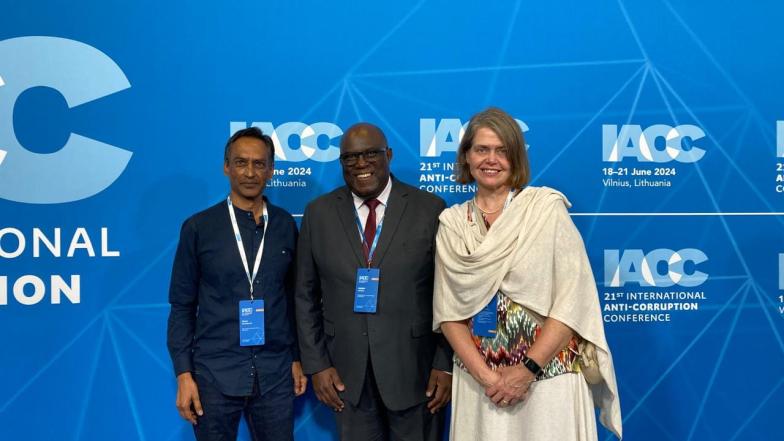
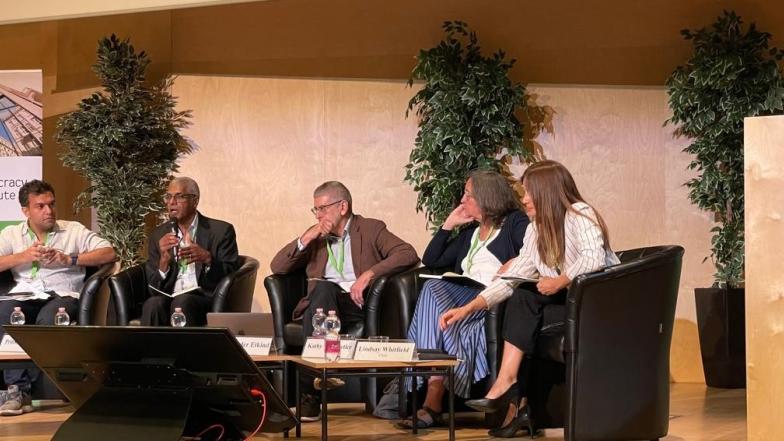
- Dr Marianne Camerer was part of a Workshop on Public Ethics in South Africa: Research and Teaching in the context of the findings of the Judicial Commission of Inquiry into Allegations of State Capture, hosted at Stellenbosch Institute for Advanced Study (STIAS).
- Prof Faizel Ismail has been appointed as a Senior Research Advisor (non-remunerated) at the University of Oxford’s Technology and Management Centre for Development (TMCD) in July 2024. He has also been appointed by the Tony Blair Institute in July 2024 to be part of an Industrial Development Advisory Council (non-remunerated) established for the Africa region.
In the news
- School with a vision — ‘living memorial’ to Nelson Mandela planned for slopes of Table Mountain
- Nelson Mandela Memorial Centre will make a significant contribution to scholarship
- 'Learning to work together at the highest level of power is essential, especially now that President Cyril Ramaphosa has unveiled the final shape of our new government of national unity,' writes Prof Faizel Ismail. This op-ed was first published by the Daily Maverick.
- An opinion piece written by Prof Brian Raftopoulos, Senior Research Fellow at the Nelson Mandela School | South Africa’s recent election sends a clear message to Zanu-PF and Zimbabwe
- 'The debt situation in African countries has escalated to a critical juncture, as multiple factors compound the challenges they confront. Three pivotal elements significantly contribute to this predicament,' writes Prof Carlos Lopes.
- Former Constitutional Court judge and anti-apartheid activist Albie Sachs discussed the independence of the Constitutional Court during an afternoon sitting at the Nelson Mandela School of Public Governance at UCT.
- 'China and Africa must ensure relationship remains solid amid growing challenges,' writes Prof Carlos Lopes


